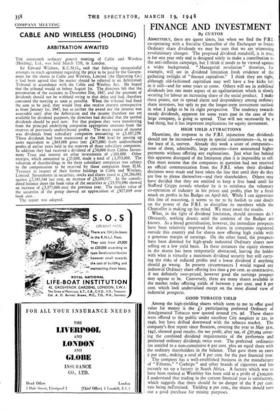FINANCE AND INVESTMENT
By CUSTOS
ADMITTEDLY, these are queer times, but when we find the F.B.I. co-operating with a Socialist Chancellor of the Exchequer to freeze Ordinary share dividends we may be sure that we are witnessing revolutionary changes. The proposed dividend standstill, it is true, is for one year only and is designed solely to make a contribution to the anti-inflation campaign, but I think it needs to be viewed against a wider background. " Managerial revolution " theorists, for example, will see in dividend limitation fresh evidence of the gathering twilight of "finance capitalism." I think they are right, although old-fashioned capitalism may well have a few kicks left in it still—and for some years to come. Others will see in stabilised dividends just one more aspect of an egalitarianism which is slowly securing for labour an increasing share of the social product. I make these points, not to spread alarm and despondency among ordinary share investors, but only to put the longer-term investment outlook in what I judge to be its right perspective. . The tendency towards steady dividends, apparent for some years past in the case of the large company, is going to spread. That will not necessarily be a bad thing, but it has important implications for equity investment.
HIGH YIELD ATTRACTIONS
Meantime, the response to the F.B.I. injunction that dividends should not be increased—except in special circumstances—is, to say the least of it, uneven. Already this week a score of companies— none of them, admittedly, large concerns—have announced higher payments without offering any explanations. Just what lies behind this apparent disregard of the limitation plan it is impossible to tell. One must assume that the companies in question had not received an official communication from the F.B.I. when their dividend decisions were made and have taken the line that until they do they are free to please themselves—and their shareholders. Others may have decided that they are entitled to keep a free hand until Sir Stafford Cripps reveals whether he is to reinforce the voluntary co-operation of industry in his prices and profits plan by a fresh attack on profits in his Budget on April 6th. While I can appreciate this line of reasoning, it seems to me to be foolish to cast doubt on the power of the F.B.I. to discipline its members while the Chancellor is making up his mind. We must await the results.
What, in the light of dividend limitation, should investors do ? Obviously, nothing drastic until the contents of the Budget are known. As a broad generalisation, however, the immediate prospects have been relatively improved for shares in companies registered outside this country and for shares now offering high yields with a generous margin of earnings. On the other hand, the prospects have been dimmed for high-grade industrial Ordinary shares now selling on a low yield basis. In these instances the equity element in the shares has been temporarily abstracted, leaving the holder with what is virtually a maximum dividend security but still carry- ing the risks of reduced profits and a lower dividend if anything should go wrong. In present circumstances I would regard any industrial Ordinary share offering less than 4 per cent. as unattractive, if not definitely over-priced, however good the earnings prospect may appear to be. Conversely, there are many shares available in the market today offering yields of between 5 per cent. and 8 per cent, which look undervalued except on the most dismal view of industrial prospects.
GOOD TOBACCO YIELD
Among the high-yielding shares which seem to me to offer good value for money is the Li participating preferred Ordinary of Amalgamated Tobacco now quoted around 17s. 9d. These shares were offered to the public under excellent City auspices at 22s. in 1946, but have drifted downward with the tobacco market. The company's first report since flotation, covering the year to May pst, 1947, showed good results, the net profit, after tax, of £67,o94 cover- ing the combined dividend requirements of the preference and preferred ordinary dividends twice over. The preferred ordinaries are entitled to a non-cumulative 6 per cent. plus an equal share with the ordinary shareholders in the balance. That gave them an extra 2 per cent., making a total of 8 per cent. for the past financial year. The company has a well-established business in the manufacture of " Fifteens," " Corktips " and other brands of cigarettes and has recently set up a factory in South Africa. A factory which was to have been opened at Wembley has been sold at a profit of Lioo,000. I understand that trading in the current financial year is satisfactory, which suggests that there should be no danger of the 8 per cent. rate being maintained. Yielding 9 per cent., the shares should turn out a good purchase for mixing purposes.






























 Previous page
Previous page